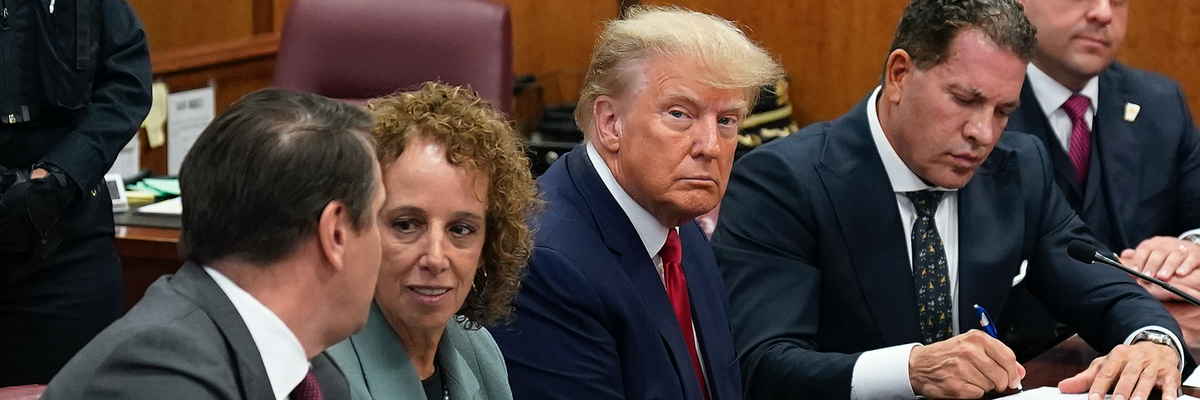Last night, Trump and 18 others were criminally charged in Georgia in connection with efforts to overturn Joe Biden’s 2020 victory in the state.
Trump was charged with 13 counts, including violating the state’s racketeering act, soliciting a public officer to violate their oath, conspiring to impersonate a public officer, conspiring to commit forgery in the first degree, and conspiring to file false documents.
The indictment also charges some of Trump’s most prominent advisers, including Rudolph W. Giuliani, his former personal lawyer, and Mark Meadows, who served as White House chief of staff at the time of the election.
Trump’s posts continue to directly and explicitly violate the conditions of Trump’s release from jail pending trial.
This indictment follows a two-and-a-half year investigation by Fulton County District Attorney Fani Willis—after audio leaked from a January 2021 phone call during which Trump urged Georgia Secretary of State Brad Raffensperger to question the validity of thousands of ballots, especially in the heavily Democratic Atlanta area, and said he wanted to “find” the votes to erase his 2020 loss in the state.
It is another step in America’s slow but steady process of criminal justice, another illustration that no one is above the law. Fani Willis and her staff deserve the nation’s thanks, as do Jack Smith and his staff, and Alvin Bragg and his staff in Manhattan.
This is not easy work under the best of circumstances. When a rogue former president is on the loose, fanning the flames of anger and recrimination, the work is fraught and potentially dangerous.
Early yesterday morning, before the Georgia grand jury met, Trump posted the following:
I am reading reports that failed former Lt. Governor of Georgia, Jeff Duncan, will be testifying before the Fulton County Grand Jury. He shouldn’t. I barely know him but he was, right from the beginning of this Witch Hunt, a nasty disaster for those looking into the Election Fraud that took place in Georgia. He refused having a Special Session to find out what went on, became very unpopular with Republicans (I refused to endorse him!), and fought the TRUTH all the way. A loser, he went to FNCNN!
I have no idea whether Mr. Duncan was intimidated by this post when he testified yesterday, whether he altered or downplayed his testimony out of fear of retribution by a Trump supporter. But the mere possibility raises a broader question that must be answered by the judges presiding over Trump’s trials—and very soon.
Trump’s conditions of release at his arraignment earlier this month included a vow—which Trump swore to uphold—that he would not intimidate or harass witnesses and officers of the court or threaten the administration of justice.
Yet he has not ceased posting inflammatory invective against potential witnesses, against potential jurors in Washington D.C., New York, and Georgia, against judges who have been assigned to hear the cases against him, against Special Counsel Jack Smith, and against other prosecutors.
His wild statements endanger all these people—we know all too well about the violent proclivities of a subset of Trump supporters. His posts could silence potential witnesses in any and all of Trump’s pending trials. His rants could intimidate jurors, prosecutors, and judges.
Trump’s posts continue to directly and explicitly violate the conditions of Trump’s release from jail pending trial.
Last Friday, federal Judge Tanya Chutkan, who is presiding over the Justice Department’s case charging Trump with federal crimes in connection with seeking to overturn the 2020 election, repeatedly instructed Trump that he is bound by laws preventing him from influencing jurors or witnesses. She said any “inflammatory remarks” that could influence a jury would hasten a trial, and she warned that “I will take whatever measures are necessary to safeguard the integrity of the case.”
Hours later, Trump called Judge Chutkan “highly partisan” and “very biased and unfair,” adding, “She obviously wants me behind bars.”
Friends, Trump is daring Judge Chutkan and other judges involved (or soon to be involved) in these four proceedings to revoke his release pending trial. He believes he can get away with intimidating and harassing potential witnesses, jurors, prosecutors, and judges. He is confident he is above the law.
He must be shown he is not above the law. His release pending trial must be revoked.
